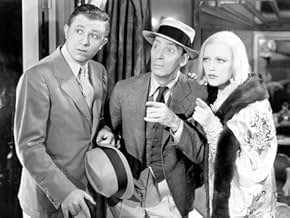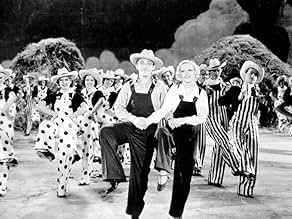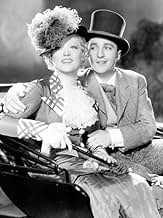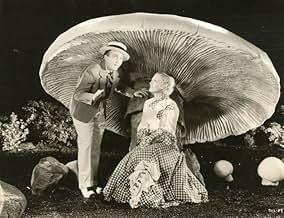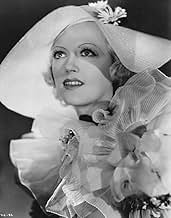A love-struck teacher pursues a radio singer to Hollywood.A love-struck teacher pursues a radio singer to Hollywood.A love-struck teacher pursues a radio singer to Hollywood.
- Director
- Writers
- Stars
- Awards
- 3 wins & 1 nomination total
The Radio Rogues
- The Radio Rogues
- (as Three Radio Rogues)
Sam Appel
- Mexican Bartender
- (uncredited)
Henry Armetta
- Henry Armetta
- (archive footage)
- (uncredited)
Eddie Bartell
- Member - Three Radio Rogues
- (uncredited)
Wallace Beery
- Wallace Beery - Premiere Clip
- (archive footage)
- (uncredited)
Clara Blandick
- Miss Perkins - Divinity Teacher
- (uncredited)
Harry Bowen
- Bartender
- (uncredited)
Nora Cecil
- Briarcroft's Teacher
- (uncredited)
Onest Conley
- Tap Dancer
- (uncredited)
Ken Darby
- Member - The King's Men
- (uncredited)
Jon Dodson
- Member - The King's Men
- (uncredited)
- Director
- Writers
- All cast & crew
- Production, box office & more at IMDbPro
Featured reviews
Spirited young teacher leaves uptight girl's school for fame and fortune in Hollywood.
I tuned in to catch the legendary Marion Davies, WR Hearst's (Citizen Kane) favorite squeeze, and was generally impressed even though the movie is unexceptional. She's got some natural charisma, and can dance and act as well as most musical performers. So this is not a case of a rich Daddy Warbucks making a silk purse out of a no-talent.
The movie itself is expensively produced with a couple impressive dance numbers (e.g. the massed train station), plus a youthful Crosby crooning at his most tuneful. But except for the torchy Temptation, the selections themselves are pretty forgettable. Nonetheless, the many behind-the-scenes look at movie sets remains fascinating. At the same time, macho director Walsh and noir producer Wanger may seem odd choices for the production end of a musical, but this is still early in their respective careers.
Speaking of directors, Ned Sparks who plays the raspy director in the movie appears to have swallowed a lemon and followed it up with a load of sandpaper, providing much of the comedy relief, along with a young Patsy Kelly. But funnier than anyone without even trying is D'Orsay's cartoonish French siren. For cultural historians, there's the guy mimicking radio personalities of the day, making an informative and entertaining novelty act. But I can't help noticing a couple of Davies', shall we say, unusual costumes—one is so fancy, it looks like the crinoline is swallowing her, while the other resembles a big furry snow cone minus the snow. Good thing the rest of her wardrobe is 30's conventional.
All in all, it's a good glimpse back in time, even if the musical end lacks staying power.
I tuned in to catch the legendary Marion Davies, WR Hearst's (Citizen Kane) favorite squeeze, and was generally impressed even though the movie is unexceptional. She's got some natural charisma, and can dance and act as well as most musical performers. So this is not a case of a rich Daddy Warbucks making a silk purse out of a no-talent.
The movie itself is expensively produced with a couple impressive dance numbers (e.g. the massed train station), plus a youthful Crosby crooning at his most tuneful. But except for the torchy Temptation, the selections themselves are pretty forgettable. Nonetheless, the many behind-the-scenes look at movie sets remains fascinating. At the same time, macho director Walsh and noir producer Wanger may seem odd choices for the production end of a musical, but this is still early in their respective careers.
Speaking of directors, Ned Sparks who plays the raspy director in the movie appears to have swallowed a lemon and followed it up with a load of sandpaper, providing much of the comedy relief, along with a young Patsy Kelly. But funnier than anyone without even trying is D'Orsay's cartoonish French siren. For cultural historians, there's the guy mimicking radio personalities of the day, making an informative and entertaining novelty act. But I can't help noticing a couple of Davies', shall we say, unusual costumes—one is so fancy, it looks like the crinoline is swallowing her, while the other resembles a big furry snow cone minus the snow. Good thing the rest of her wardrobe is 30's conventional.
All in all, it's a good glimpse back in time, even if the musical end lacks staying power.
Beautiful blonde French teacher Marion Davies (as Sylvia Bruce) quits her job to pursue radio crooner Bing Crosby (as Bill Williams) to Hollywood, where Mr. Crosby is going to star in a motion picture. In Los Angeles, Ms. Davies moves in with new pal Patsy Kelly (as Jill Barker), who thinks Davies could be a movie star "better than Norma Shearer." Good one. Davies continues to swoon over Crosby, who is only has eyes for French co-star Fifi D'Orsay (as Lili Yvonne). Which of the dueling damsels will win Crosby's heart?
A fine supporting cast, director (Raoul Walsh), and budget make this is a pleasant Bing Crosby musical masquerading as a Marion Davies movie. Two of Crosby's Brunswick 78 RPM recordings were hits: sung herein to Sterling Holloway, "Beautiful Girl" reached #11; the best film song "Temptation" went to #3; and, the big production number "We'll Make Hay While the Sun Shines" peaked at #8.
"Three Radio Rogues" singing impersonations are also highlights, with Jimmy Hollywood managing Kate Smith's "When the Moon Comes Over the Mountain" with uncanny ease. Mainly, though, it's Crosby's show.
***** Going Hollywood (12/22/33) Raoul Walsh ~ Bing Crosby, Marion Davies, Fifi D'Orsay, Patsy Kelly
A fine supporting cast, director (Raoul Walsh), and budget make this is a pleasant Bing Crosby musical masquerading as a Marion Davies movie. Two of Crosby's Brunswick 78 RPM recordings were hits: sung herein to Sterling Holloway, "Beautiful Girl" reached #11; the best film song "Temptation" went to #3; and, the big production number "We'll Make Hay While the Sun Shines" peaked at #8.
"Three Radio Rogues" singing impersonations are also highlights, with Jimmy Hollywood managing Kate Smith's "When the Moon Comes Over the Mountain" with uncanny ease. Mainly, though, it's Crosby's show.
***** Going Hollywood (12/22/33) Raoul Walsh ~ Bing Crosby, Marion Davies, Fifi D'Orsay, Patsy Kelly
This musical comedy features beautiful Marion as a bored French teacher who runs off to Hollywood. Seems like a standard 30s musical. But wait. The narrative structure of this film is more complex than it at first seems.
At a teachers' meeting at the Briarcroft School, one old maid complains that Davies (she teaches French) is always late because she spends too much time dreaming. They take her some papers to correct and find her.
When Davies turns on the radio and gazes out at the night sky she starts to wish upon a star. Just as she says "I wish I may, I wish I might...." Bing Crosby's voice cuts across the moment as he begins the lyric of "Our Big Love Scene": "Don't waste the night in wishing..." as though in answer to Davies' wish upon a star. She sits up, startled, and packs her bags.
So sets off not to go to Hollywood, but only to find Crosby, who plays a famous radio singer about to embark by train to Hollywood to star in a picture. Crosby is also involved with the picture's French star, played by Fifi D'Orsay. As Crosby is packing up to go, and after a live broadcast of his singing "Beautiful Girl" to Sterling Holloway, Davies finds him. He brushes her off as just another fan and heads to the Grand Central Station, where he sings "Going Hollywood."
On the train, who should show up but Davies. In today's context, Davies is certainly a crazed fan stalking her idol, but in 1933 her actions were (in the context of this film) acceptable. D'Orsay catches the two together (Davies is correcting Crosby's French pronunciation) and immediately suspects them of being up to something. D'Orsay is on the rampage because her maid has quit. Of course Davies becomes her maid, having taught French and all. The second time D'Orsay catches them together, she slaps Davies. Davies quits her job.
Next we find Davies in Hollywood at "Central Casting," asking to see Crosby. She's turned away and meets Patsy Kelly, a film extra. They hit it off right away, and Kelly invites Davies to share her digs. The director (Ned Sparks) walks by and hires them as extras in the film starring Crosby and D'Orsay.
At Kelly's bungalow, Davies takes a nap and has a bizarre dream about herself and Crosby starring in a surreal production number called "We'll Make Hay While the Sun Shines." While Davies dreams, we are shown a huge close up of her face, which is occasionally superimposed over the dream-scene action so that we don't forget it's all a dream. The scene opens with Crosby and Davies in a cozy cottage. Crosby starts the song, and the couple is strolling through a field of giant, swaying daisies and then sitting in a carriage where Davies joins Crosby in a brief duet. They come upon a farm scene of dancing scarecrows . Suddenly Davies emerges from the dancers and takes center stage in a dance lively number. But Crosby and Davies are still sitting in the carriage. Davies points to herself dancing and asks Crosby, "me?" He nods and soon he also is in the dance number. A windstorm suddenly comes up and everyone is drenched by the downpour. Crosby and Davies run back to the cozy cottage where they sit by the fire, wrapped in blankets, while Crosby finishes the song.
On the movie set, Davies once again finds Crosby. He's in between scenes when Davies approaches. She's in blackface and dressed like Aunt Jemima. He doesn't seem to notice that she is not really black. D'Orsay catches them again and slaps Davies for a second time.
Next we're on location and D'Orsay is about to sing her big number, "Cinderella's Fella." The number has a Cinderella theme with the blonde-wigged D'Orsay as the Prince. As she launches into the song, Sparks stops her and tells he she's doing it all wrong because she's doing it as a kooch dance. She throws a fit and storms off the set. Back in her trailer, Crosby tries to comfort her. Meanwhile, back on the set, the Radio Rogues do a series of impressions of current radio stars who include Kate Smith, Morton Downey, and Crosby's singing rival of the day-Russ Columbo.
Davies is then coaxed into doing an impression (Davies was famous for her ability to mimic, and does so in several of her films). Of course she launches into an impression of D'Orsay singing. D'Orsay hears this and marches out to catch Davies in mid-dance and hauls off and slaps her for a third time. This time Davies strikes back and delivers D'Orsay a black eye. D'Orsay quits and Davies is hired to star in the film! Talk about your Hollywood dream!
There is an abbreviated scene, with Davies and Crosby dating, with Crosby singing the wonderful "After Sundown." Later, Davies attempts to deliver some flowers to Crosby, but standing in the hallway outside his door she hears D'Orsay talking to Crosby.
D'Orsay lures Crosby to a Mexican bar and plies him with drinks, knowing he will be fired from the picture after being absent for days. Davies tracks him down yet again and tries to get him back but he's drunk and can't think straight. This sets up the film's best number and another yet dream sequence. Crosby sings "Temptation" while sitting at the bar and drinking what looks like absinthe. As he sings we see huge close-ups of D'Orsay (to match the close-ups of Davies in the previous dream sequence) and cutaway shots of a dance floor crowded with same-sex couples. In the bar itself, no one is dancing. As Crosby approaches the last notes of the song, he lifts his glass and drains the last drops. It's an amazing sequence.
The scene shifts back to the film set where, after seeing a dance montage to "Cinderella's Fella," Davies is about to film an elaborate production number, be-gowned in a massive ermine and sequin outfit. As she is about to begin the scene with Crosby's replacement, Bing can be heard reprising "Our Big Love Scene," and the lovers meet. End of film.
At a teachers' meeting at the Briarcroft School, one old maid complains that Davies (she teaches French) is always late because she spends too much time dreaming. They take her some papers to correct and find her.
When Davies turns on the radio and gazes out at the night sky she starts to wish upon a star. Just as she says "I wish I may, I wish I might...." Bing Crosby's voice cuts across the moment as he begins the lyric of "Our Big Love Scene": "Don't waste the night in wishing..." as though in answer to Davies' wish upon a star. She sits up, startled, and packs her bags.
So sets off not to go to Hollywood, but only to find Crosby, who plays a famous radio singer about to embark by train to Hollywood to star in a picture. Crosby is also involved with the picture's French star, played by Fifi D'Orsay. As Crosby is packing up to go, and after a live broadcast of his singing "Beautiful Girl" to Sterling Holloway, Davies finds him. He brushes her off as just another fan and heads to the Grand Central Station, where he sings "Going Hollywood."
On the train, who should show up but Davies. In today's context, Davies is certainly a crazed fan stalking her idol, but in 1933 her actions were (in the context of this film) acceptable. D'Orsay catches the two together (Davies is correcting Crosby's French pronunciation) and immediately suspects them of being up to something. D'Orsay is on the rampage because her maid has quit. Of course Davies becomes her maid, having taught French and all. The second time D'Orsay catches them together, she slaps Davies. Davies quits her job.
Next we find Davies in Hollywood at "Central Casting," asking to see Crosby. She's turned away and meets Patsy Kelly, a film extra. They hit it off right away, and Kelly invites Davies to share her digs. The director (Ned Sparks) walks by and hires them as extras in the film starring Crosby and D'Orsay.
At Kelly's bungalow, Davies takes a nap and has a bizarre dream about herself and Crosby starring in a surreal production number called "We'll Make Hay While the Sun Shines." While Davies dreams, we are shown a huge close up of her face, which is occasionally superimposed over the dream-scene action so that we don't forget it's all a dream. The scene opens with Crosby and Davies in a cozy cottage. Crosby starts the song, and the couple is strolling through a field of giant, swaying daisies and then sitting in a carriage where Davies joins Crosby in a brief duet. They come upon a farm scene of dancing scarecrows . Suddenly Davies emerges from the dancers and takes center stage in a dance lively number. But Crosby and Davies are still sitting in the carriage. Davies points to herself dancing and asks Crosby, "me?" He nods and soon he also is in the dance number. A windstorm suddenly comes up and everyone is drenched by the downpour. Crosby and Davies run back to the cozy cottage where they sit by the fire, wrapped in blankets, while Crosby finishes the song.
On the movie set, Davies once again finds Crosby. He's in between scenes when Davies approaches. She's in blackface and dressed like Aunt Jemima. He doesn't seem to notice that she is not really black. D'Orsay catches them again and slaps Davies for a second time.
Next we're on location and D'Orsay is about to sing her big number, "Cinderella's Fella." The number has a Cinderella theme with the blonde-wigged D'Orsay as the Prince. As she launches into the song, Sparks stops her and tells he she's doing it all wrong because she's doing it as a kooch dance. She throws a fit and storms off the set. Back in her trailer, Crosby tries to comfort her. Meanwhile, back on the set, the Radio Rogues do a series of impressions of current radio stars who include Kate Smith, Morton Downey, and Crosby's singing rival of the day-Russ Columbo.
Davies is then coaxed into doing an impression (Davies was famous for her ability to mimic, and does so in several of her films). Of course she launches into an impression of D'Orsay singing. D'Orsay hears this and marches out to catch Davies in mid-dance and hauls off and slaps her for a third time. This time Davies strikes back and delivers D'Orsay a black eye. D'Orsay quits and Davies is hired to star in the film! Talk about your Hollywood dream!
There is an abbreviated scene, with Davies and Crosby dating, with Crosby singing the wonderful "After Sundown." Later, Davies attempts to deliver some flowers to Crosby, but standing in the hallway outside his door she hears D'Orsay talking to Crosby.
D'Orsay lures Crosby to a Mexican bar and plies him with drinks, knowing he will be fired from the picture after being absent for days. Davies tracks him down yet again and tries to get him back but he's drunk and can't think straight. This sets up the film's best number and another yet dream sequence. Crosby sings "Temptation" while sitting at the bar and drinking what looks like absinthe. As he sings we see huge close-ups of D'Orsay (to match the close-ups of Davies in the previous dream sequence) and cutaway shots of a dance floor crowded with same-sex couples. In the bar itself, no one is dancing. As Crosby approaches the last notes of the song, he lifts his glass and drains the last drops. It's an amazing sequence.
The scene shifts back to the film set where, after seeing a dance montage to "Cinderella's Fella," Davies is about to film an elaborate production number, be-gowned in a massive ermine and sequin outfit. As she is about to begin the scene with Crosby's replacement, Bing can be heard reprising "Our Big Love Scene," and the lovers meet. End of film.
'Going Hollywood's' biggest attraction was Bing Crosby, who had one of the most beautiful and distinctive male (and in general) singing voices on film, as well as being a master of how to use it.
Crosby is certainly the best thing about 'Going Hollywood'. He seems relaxed, has a lot of charm and looks and sounds wonderful, his beautiful smooth voice used with impeccable phrasing and control as always. Great songs also helps, something that 'Going Hollywood' certainly has, the standouts being the title song, "Temptation" and "Beautiful Girl".
Of the production numbers, choreographically the best is the train station sequence which is so lively and entertaining. Although Raoul Walsh did seem a bit of an odd choice at first as director, often going for the tougher and darker edge to his films, but he does direct with a light touch without being too lightweight. Really enjoyed Patsy Kelly, who brings plenty of sass and allure. While going on a little too long, the Three Radio Rogues are also entertaining, and while overlong and overblown parts of the dream sequence are quite sweet.
However, was very much mixed on Marion Davies. She is attractive and does bring some charm and fun, but at other points she does look stiff and limitations in her singing and dancing show. Stuart Erwin has an appealing earnestness but has little to do, while Ned Sparks does smarmy well but the character is written with so little variation that it feels one-dimensional. Worst of all is Fifi D'Orsay, her character being an annoying cartoonish caricature made even more insufferable by that D'Orsay overacts to such a wild degree.
While some of the dream sequence was quite nice, the dancing scarecrows part does feel really bizarre and also jars. The bit with the blackface is neither cute or funny and even those who hardly ever scream racism will find it in bad taste. The script has some wit, but is also shallow and flaccid. The story while at first lively in pace constantly feels too convenient and too neatly wrapped up, while also dragging towards the end, having a premise and romance that rarely rings true and being paper thin. Characterisation is even thinner, development practically forgotten about.
All in all, many charms but also some big caveats. 5/10 Bethany Cox
Crosby is certainly the best thing about 'Going Hollywood'. He seems relaxed, has a lot of charm and looks and sounds wonderful, his beautiful smooth voice used with impeccable phrasing and control as always. Great songs also helps, something that 'Going Hollywood' certainly has, the standouts being the title song, "Temptation" and "Beautiful Girl".
Of the production numbers, choreographically the best is the train station sequence which is so lively and entertaining. Although Raoul Walsh did seem a bit of an odd choice at first as director, often going for the tougher and darker edge to his films, but he does direct with a light touch without being too lightweight. Really enjoyed Patsy Kelly, who brings plenty of sass and allure. While going on a little too long, the Three Radio Rogues are also entertaining, and while overlong and overblown parts of the dream sequence are quite sweet.
However, was very much mixed on Marion Davies. She is attractive and does bring some charm and fun, but at other points she does look stiff and limitations in her singing and dancing show. Stuart Erwin has an appealing earnestness but has little to do, while Ned Sparks does smarmy well but the character is written with so little variation that it feels one-dimensional. Worst of all is Fifi D'Orsay, her character being an annoying cartoonish caricature made even more insufferable by that D'Orsay overacts to such a wild degree.
While some of the dream sequence was quite nice, the dancing scarecrows part does feel really bizarre and also jars. The bit with the blackface is neither cute or funny and even those who hardly ever scream racism will find it in bad taste. The script has some wit, but is also shallow and flaccid. The story while at first lively in pace constantly feels too convenient and too neatly wrapped up, while also dragging towards the end, having a premise and romance that rarely rings true and being paper thin. Characterisation is even thinner, development practically forgotten about.
All in all, many charms but also some big caveats. 5/10 Bethany Cox
I watched this movie because I wanted to see what Marion Davies could do in a comedy, which is supposedly what she did best. She was an attractive woman, with - at least on screen - a pleasant, unpretentious personality, so I figured she might indeed do well in comedy.
But this script, by the much admired David Ogden Stewart, gives her nothing to work with. She delivers her lines ok, but the lines are so uninteresting that I don't know what Helen Hayes could have done with them.
Davies has to dance, and she's passable but no better. But then, no worse than Crawford or some other actresses of the era who were given dance numbers. Davies has to sing, and again, she's not bad, but nothing special.
In short, this movie doesn't make a case for Davies as an actress in comedy. It doesn't make her look bad, but it doesn't make you think she was a great comedian, either.
For me, the best thing, the only really good thing, in this movie was Bing Crosby's delivery of some of his musical numbers, in particular *Temptation*, a great song that he brings off very well. The other musical numbers, like the script, are bland and forgettable.
I'm surprised that Hearst, with all his money and power, couldn't have seen to it that Davies had better material. But then, perhaps the problem was not with her but with him: maybe he couldn't tell if a movie script was good or bad and imposed bad ones on her.
But this script, by the much admired David Ogden Stewart, gives her nothing to work with. She delivers her lines ok, but the lines are so uninteresting that I don't know what Helen Hayes could have done with them.
Davies has to dance, and she's passable but no better. But then, no worse than Crawford or some other actresses of the era who were given dance numbers. Davies has to sing, and again, she's not bad, but nothing special.
In short, this movie doesn't make a case for Davies as an actress in comedy. It doesn't make her look bad, but it doesn't make you think she was a great comedian, either.
For me, the best thing, the only really good thing, in this movie was Bing Crosby's delivery of some of his musical numbers, in particular *Temptation*, a great song that he brings off very well. The other musical numbers, like the script, are bland and forgettable.
I'm surprised that Hearst, with all his money and power, couldn't have seen to it that Davies had better material. But then, perhaps the problem was not with her but with him: maybe he couldn't tell if a movie script was good or bad and imposed bad ones on her.
Did you know
- TriviaWhen Marion Davies requested Bing Crosby as her leading man for this film, he was under contract to Paramount, where they had him starring in shorts and a series of college themed films with Jack Oakie. The success of this film moved Crosby into starring roles at Paramount with the likes of Carole Lombard and Miriam Hopkins, a definite step upwards.
- Quotes
Bill 'Billy' Williams: [singing] Out where they say, "Let us be gay," I'm going Hollywood. I'll ballyhoo greetings to you, I'm going Hollywood. Hey, while you sleepyheads are in that hay, I'll be dancing - I'm gonna be dancing with a sun-kissed baby. And I'm on my way - here's my beret, I'm going Hollywood!
- ConnectionsEdited into The Big Idea (1934)
- SoundtracksGoing Hollywood
(1933) (uncredited)
Music by Nacio Herb Brown
Lyrics by Arthur Freed
Played during the opening credits
Sung by Bing Crosby at the railroad station
Played as background music twice
Details
- Release date
- Country of origin
- Official site
- Languages
- Also known as
- Going Hollywood
- Filming locations
- Production companies
- See more company credits at IMDbPro
Box office
- Budget
- $914,000 (estimated)
- Runtime
- 1h 18m(78 min)
- Color
- Aspect ratio
- 1.37 : 1
Contribute to this page
Suggest an edit or add missing content

